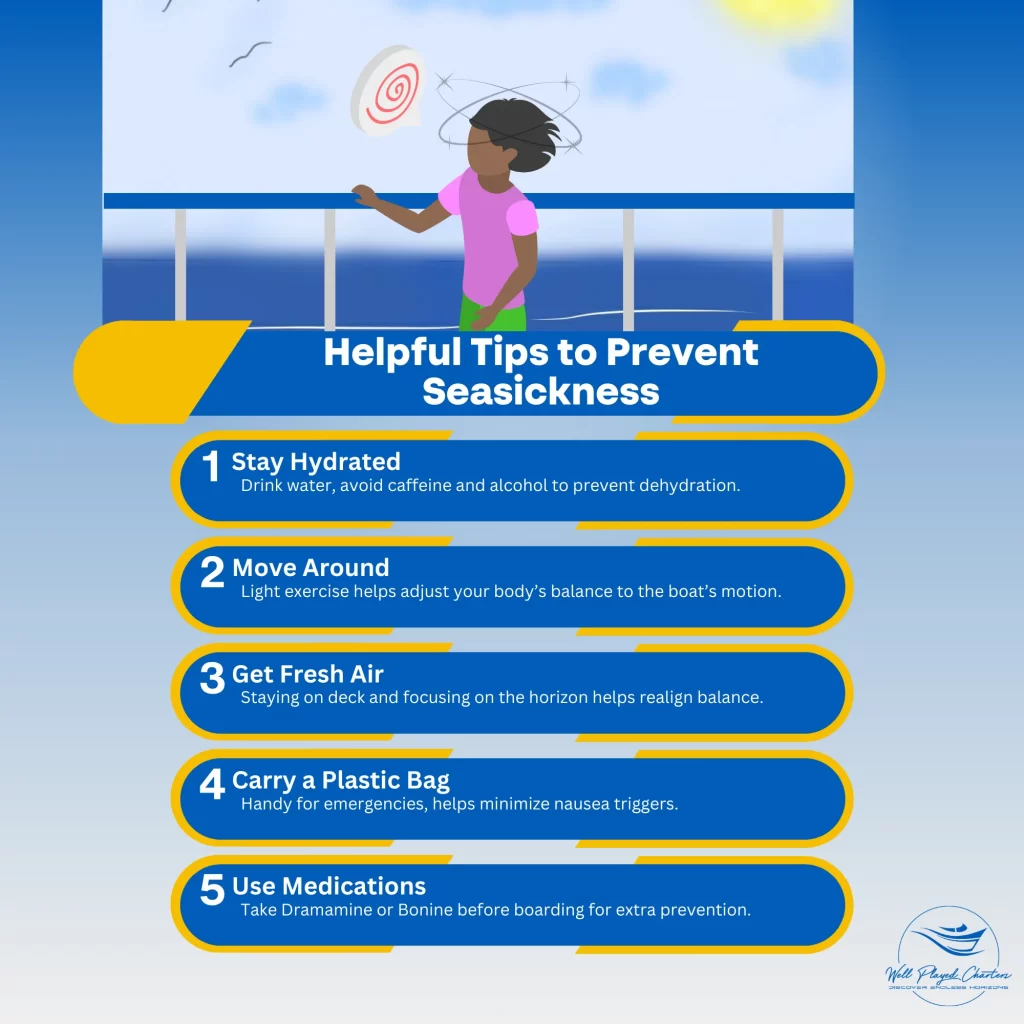To stop seasickness, maintain your fluid intake but avoid alcohol and caffeine, which can dehydrate and worsen symptoms. Keep moving on deck to help your body adjust to the boat’s movements; the horizon acts as a stable reference point that can realign your balance. A simple plastic bag can serve as an emergency container, minimizing nausea among crew and passengers. Over-the-counter medications like Dramamine or Bonine are popular options, but all treatments should be tailored to each individual’s response. Be sure to check us out further for more in-depth tips and information on managing seasickness effectively.

Key Takeaways
- Maintain adequate fluid intake, preferably water or herbal teas, to prevent dehydration which worsens seasickness.
- Engage in light exercises, such as walking or stretching, to help your body adjust to the boat’s movement.
- Spend time on the deck for fresh air and fix your gaze on the horizon to help realign your balance.
- Carry a plastic bag as an emergency container for nausea, aiding in quick cleanup and recovery.
- Consider over-the-counter anti-motion sickness medications like Dramamine or Bonine, taken in advance for prevention.
Maintain your fluid intake
Maintaining adequate fluid intake is an essential step in preventing seasickness during your luxury charter experience. Dehydration can exacerbate symptoms, making it harder to find seasickness relief.
It’s important to remember that alcohol and caffeine, often plentiful on cruises, can dehydrate you. Opt instead for water, herbal teas, or sports drinks that replenish electrolytes.
When working to prevent seasickness on cruise vacations, it’s not just about how much you drink, but also when. Avoid drinking large amounts at once, as filling your stomach can trigger nausea. Instead, sip slowly throughout the day. Keeping a refillable water bottle with you can make this easier.
Food can also impact hydration. Opt for fruits and veggies, which are high in water content, over salty snacks that can increase thirst. Meals should be light and balanced, as overeating can also induce nausea.
Lastly, know that seasickness can occur even when you’re well-hydrated. If you find yourself feeling unwell, seek medical assistance onboard. Many luxury charters are equipped to provide seasickness relief, ensuring your journey remains enjoyable.
Keep moving
Ever thought about how staying in motion could help combat seasickness? It’s an effective strategy you can use not only to distract yourself, but also to recalibrate your body’s sense of balance. In fact, it’s one of the most recommended ways on how to stop seasickness on a boat.
When you’re on a boat, your body’s inner ear sends confusing signals to your brain because the motion it senses doesn’t match what your eyes are seeing. This is what causes seasickness. But by moving around, you’re helping your body adjust to the boat’s motion.
Here are some ways you can keep moving:
- Walk around the deck. It can help your body adapt to the boat’s movement.
- Engage in activities. It’ll distract you from the feeling of seasickness.
- Perform light exercises. Stretching and bending can help keep your blood circulating.
Preventing seasickness on a cruise or on a boat trip is possible if you take the right steps. Remember, it’s important to keep moving to help your body adjust to the unfamiliar motion of the boat.
Stay on deck. Fresh air is often enough to speed recovery
In addition to maintaining motion, another effective strategy to combat seasickness is to stay on the deck. The fresh air alone can often speed recovery, and the horizon’s stable reference point can help realign your body’s sense of balance, essential for how to stop seasickness.
When you’re inside a cabin, your inner ear senses motion while your eyes perceive a still environment, causing dissonance that can lead to seasickness. On deck, your senses are in harmony as both sight and balance feel the motion in synchrony. Consequently, the deck is your haven, a place where your symptoms may lessen or even disappear.
Even if you’re feeling nauseous, resist the urge to lie down inside. Instead, stand up and step outside. Let the cool breeze hit your face, and set your gaze on the horizon. This is a practical tip to avoid seasickness that seasoned sailors swear by.
Carry a plastic bag
Despite its seemingly simplistic nature, carrying a plastic bag can be a game-changer in your fight against seasickness. This common household item, often overlooked, can prove to be an essential tool when you’re on the high seas.
The purpose of carrying a plastic bag is threefold:
- It serves as an emergency container. If you’re unable to reach the restroom in time, a plastic bag can serve as a quick, disposable solution to prevent an unpleasant mess.
- It helps to minimize the spread of nausea. If one person gets sick, the sight or smell can trigger seasickness in others. Using a bag can contain this and help prevent a chain reaction.
- Finally, it aids in cleanup. Should you succumb to seasickness, a bag can make the aftermath easier to deal with, helping you regain your composure quicker.
Consider an over-the-counter medication
While carrying a plastic bag is a practical measure, it’s also wise to have a proactive strategy to combat seasickness. Considering an over-the-counter medication is a viable option for seasickness prevention.
Products such as Dramamine or Bonine are popular choices, acting as antihistamines to help prevent and treat motion sickness symptoms.
If you’re wondering how to stop seasickness on a cruise, these medications could be your answer. They’re designed to be taken before your journey begins, offering a preemptive strike against the discomfort that could ruin your voyage.
It’s crucial to read the instructions and side effects carefully, though. Some may cause drowsiness, so adjust your activities accordingly.
Also, it’s worth noting that everyone’s body responds differently to medication. What works for one person may not work as effectively for another.
Consequently, it’s advisable to test the medication before your cruise to understand how your body reacts to it.
Frequently Asked Questions
What Foods Should I Avoid Before and During the Sea Journey to Prevent Seasickness?
You should avoid heavy, fatty, or spicy meals before and during your sea journey. It’s best to stick with light, bland foods. Don’t forget to keep yourself well-hydrated, but avoid excessive alcohol and caffeine.
Can Certain Smells or Scents Exacerbate Seasickness Symptoms or Potentially Alleviate Them?
Yes, certain smells can worsen seasickness. Strong odors like diesel or food may trigger nausea. Conversely, fresh, natural scents like lemon or peppermint can potentially alleviate symptoms. Always keep your environment well-ventilated.
Do Any Specific Breathing Exercises or Techniques Help in Combating Seasickness?
Yes, specific breathing exercises can help combat seasickness. Focusing on deep, slow breaths calms your nervous system, reduces stress, and can help alleviate symptoms. It’s also beneficial to find fresh air when possible.
How Does Seasickness Affect Pregnant Women and What Precautions Should They Take?
Seasickness can intensify morning sickness in pregnant women. You should consult with your doctor before sailing, stay hydrated, and avoid heavy meals. Consider wristbands for acupressure or over-the-counter medications approved by your healthcare provider.
Are There Any Effective Natural Remedies or Herbs That Can Help Prevent Seasickness?
Yes, you can try ginger, a natural remedy known to ease stomach discomfort. Peppermint also helps soothe the tummy. Acupressure wristbands can be beneficial too. Remember, it’s always best to consult your doctor first.
Conclusion
Don’t let seasickness be the iceberg that sinks your dream sailing adventure. With the right preparations and strategies, it’s a foe you can outmaneuver. So, keep hydrated, stay active, breathe in the fresh air on deck, and consider medication if necessary. Remember, you’re the captain of your ship and seasickness doesn’t have to rule your voyage. Embrace these tips, navigate the waves with confidence, and enjoy every moment of your ocean journey.

